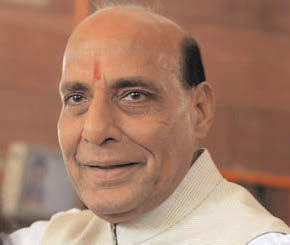
NEW DELHI (TIP): The BJP on September 13 chose to ignore L K Advani’s tenacious resistance and declared Gujarat chief minister Narendra Modi as its prime ministerial candidate for the 2014 Lok Sabha election. It’s a decision that not only signals a decisive victory for Modi in the protracted power struggle in BJP but marks the end of the old order and emergence of a new one. On a day of high political drama as Advani vacillated between attending or keeping away from the crucial meeting of the BJP parliamentary board, party president Rajnath Singh decided to take the plunge and end the suspense over Modi’s candidature even as the veteran decided to stay away.
Modi’s ascension is expected to set the stage for a presidential-style Lok Sabha election with him being pitted against Rahul Gandhi. Although the latter hasn’t yet been projected as the Congress candidate, recentlyManmohan Singh said that the Gandhi scion was ready for the top job. On Friday, however, the focus was on the BJP’s power struggle. While sticking to his stance that Modi’s projection at this stage would polarize the electorate, Advani had indicated to Rajnath and Nitin Gadkari on Thursday evening that he would attend the meeting, though only to submit his note of dissent. However, at 3.30 pm on Friday, he told Rajnath Singh that he will not attend, and followed that up by shooting off a letter complaining about party chief’s style of functioning. The letter was conspicuously silent about the party’s move to project Modi as its PM candidate.
Senior leaders had rushed to Advani when he lodged a similar complaint in public after Modi was appointed the head of the national campaign committee in June. The show of dissidence, however, attracted indifference this time. In fact, if his absence once again advertized the rift in the party, it also spared Advani the isolation he would have faced if he had attended the meeting. In the end, expectations of Modi’s opponents finding support proved wrong. Sushma Swaraj reiterated her objections in the afternoon – mainly that Modi’s projection at this time would be premature and work to Congress’s advantage — but ended saying she would go by the party’s decision. Other leaders with reservations about Modi, like M M Joshi and Ananth Kumar, did not demur and endorsed Rajnath Singh’s view that Modi’s nomination reflected the collective wishes of BJP rank and file and the Sangh parivar as a whole.
The formalization of Modi’s candidature may not spell an end to factional troubles in BJP, but it puts him clearly ahead of his peers and decisively turns the page on the Vajpayee-Advani era. Modi responded to his elevation by thanking leaders and colleagues. He even went to Advani’s residence as a goodwill gesture. “I will spare no effort to ensure that the BJP wins in 2014 elections and I measure up to the expectations and aspirations of common citizen and workers and sympathizers of the BJP,” said Modi in his acceptance speech as he recalled his rise from an ordinary worker “of humble origin from a nondescript place”. He also unveiled his campaign plank by seeking the support of people to help BJP steer the country out of the “current crisis”, created by mismanagement and corruption, by ushering in good governance and development.
The rise of Modi, who enjoys impressive ratings as an administrator, but is seen as a polarizing figure struggling to leave behind the accusation of complicity in 2002 riots, marks the emergence of a new kind of right-wing politics which unabashedly celebrates development and economic growth. He is set to run an intense campaign to challenge Congress, and is expected to hit the ground running by bringing back rebels like B S Yeddyurappa and B Sriramulu in Karnataka, and Babulal Marandi in Jharkhand. He is also expected to initiate poll alliance talks with AGP in Assam, and Om Prakash Chautala and Kuldeep Bishnoi in Haryana, besides exploring the possibility of a grand saffron alliance comprising the BJP, Shiv Sena and Raj Thackeray in Maharashtra. The two NDA allies, Shiv Sena and Akali Dal, readily extended their support. The speed of Sena’s decision was significant , considering that Udhav Thackeray appeared to be uneasy with Modi and would often take digs at the leader.




Be the first to comment